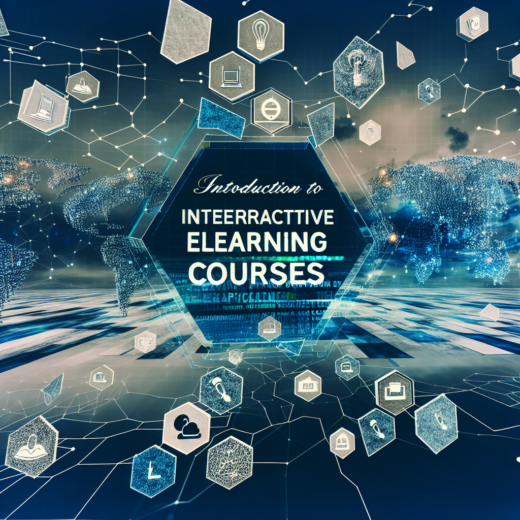Introduction to Interactive eLearning Courses
In today’s fast-paced, technology-driven world, education has undergone a remarkable transformation, with eLearning playing a crucial role in how knowledge is disseminated. A significant development in this space is the emergence of interactive eLearning courses that incorporate gamified content to boost engagement. These courses redefine traditional learning methods, creating innovative opportunities for startups to disrupt the market. The integration of interactive elements in eLearning promises not only higher engagement but also better retention of information, providing both learners and educators with a dynamic and effective educational tool.
Innovation Potential and Market Disruption
Interactive eLearning courses stand at the crossroads of education and technology, offering immense potential for innovation. By leveraging game design principles, these solutions transform passive content consumption into active learning experiences. Elements such as rewards, challenges, and points motivate learners to complete courses, making education more engaging and enjoyable.
This approach significantly disrupts the traditional education market. Schools, universities, and corporate training programs are increasingly adopting these methods to enhance learner experiences. Statista reports that the global eLearning market is projected to exceed $370 billion by 2026, indicating vast potential for startups aiming to capitalize on this growing trend. The flexibility and scalability of digital platforms allow these startups to reach global audiences while tailoring content to individual learner preferences through personalized learning pathways.
Key Challenges in Building Interactive eLearning Courses
Despite their transformative potential, interactive eLearning courses come with their set of challenges. Content creation requires a delicate balance between educational rigor and interactive entertainment. Developing high-quality gamified content involves significant investment in instructional design and technology development, often necessitating collaboration between educators, designers, and software developers.
Another challenge lies in technical barriers, such as ensuring compatibility across multiple devices and platforms, offering a seamless user experience, and maintaining robust cybersecurity measures to protect user data. Additionally, cultural differences in learning preferences necessitate customization for diverse audiences, further complicating content development.
Unique Opportunities for Startups
Startups exploring interactive eLearning courses have the advantage of agility and innovation in a rapidly evolving market. They can leverage cutting-edge technologies such as artificial intelligence, virtual reality, and augmented reality to create unprecedented learning experiences. AI can enable personalized learning experiences by analyzing user data to suggest courses and tailor content to individual learning speeds and styles.
Moreover, virtual and augmented reality can provide immersive environments that replicate real-world scenarios, particularly beneficial in fields like medical training and engineering. Such technologies not only enhance engagement but also eliminate geographic and cost barriers, allowing learners from remote locations to access premium educational content.
Strategies for Success
To succeed in this competitive landscape, startups need to focus on several critical strategies:
-
Fundraising: Interactive eLearning startups must secure substantial funding to invest in content development, technology, and marketing. Venture capitalists and angel investors specializing in EdTech are viable sources of funding. Demonstrating a clear monetization strategy and a scalable business model is essential to attracting investors.
-
Achieving Product-Market Fit: Understanding the target audience is crucial. Startups should conduct thorough market research to identify gaps in existing educational offerings and create tailored solutions that meet these needs. Developing prototype courses and gathering user feedback can help refine the product and ensure it resonates with the audience.
-
Customer Acquisition: Building a loyal customer base involves strategic marketing and partnership efforts. Partnering with educational institutions and corporate organizations can enhance credibility and provide access to a wider pool of learners. Effective use of digital marketing campaigns, social media, and influencers can also drive customer acquisition.
- Scaling Operations: As the business grows, startups must focus on scaling operations without sacrificing quality. This involves streamlining processes, potentially automating content updates, and hiring skilled professionals to manage increased demand. Maintaining an agile infrastructure that can quickly adapt to changing market needs is critical.
Case Studies and Real-World Examples
Several startups have successfully harnessed the power of interactive eLearning to carve out their niche in the market:
-
Kahoot!: This game-based learning platform has revolutionized classrooms and corporate training environments by making learning fun and engaging through live quizzes and interactive sessions.
-
Coursera: By incorporating interactive assessments and peer-reviewed assignments into their MOOC (Massive Open Online Course) models, Coursera manages to maintain high engagement rates among learners worldwide.
-
Duolingo: Known for its gamified approach to language learning, Duolingo uses streaks, leaderboards, and reward systems to keep users motivated and engaged over extended periods.
Academic and Industry Support
Academic research supports the effectiveness of gamification in enhancing learning outcomes. Studies, such as those published in the Journal of Educational Psychology, indicate that gamified learning can significantly impact motivation and retention. Industry reports, like those from Deloitte and McKinsey, discuss the emerging trend of corporate investment in eLearning as companies seek to re-skill employees efficiently.
Conclusion
The intersection of education and technology through interactive eLearning courses presents promising opportunities for startups aiming to innovate and disrupt traditional education models. While there are challenges, the potential rewards make this an exciting space. By adopting strategic approaches in fundraising, scaling, and customer acquisition, and by leveraging emerging technologies, startups can establish themselves as leaders in the eLearning landscape. As this industry continues to evolve, those who prioritize engagement and personalization will likely see the greatest success.

